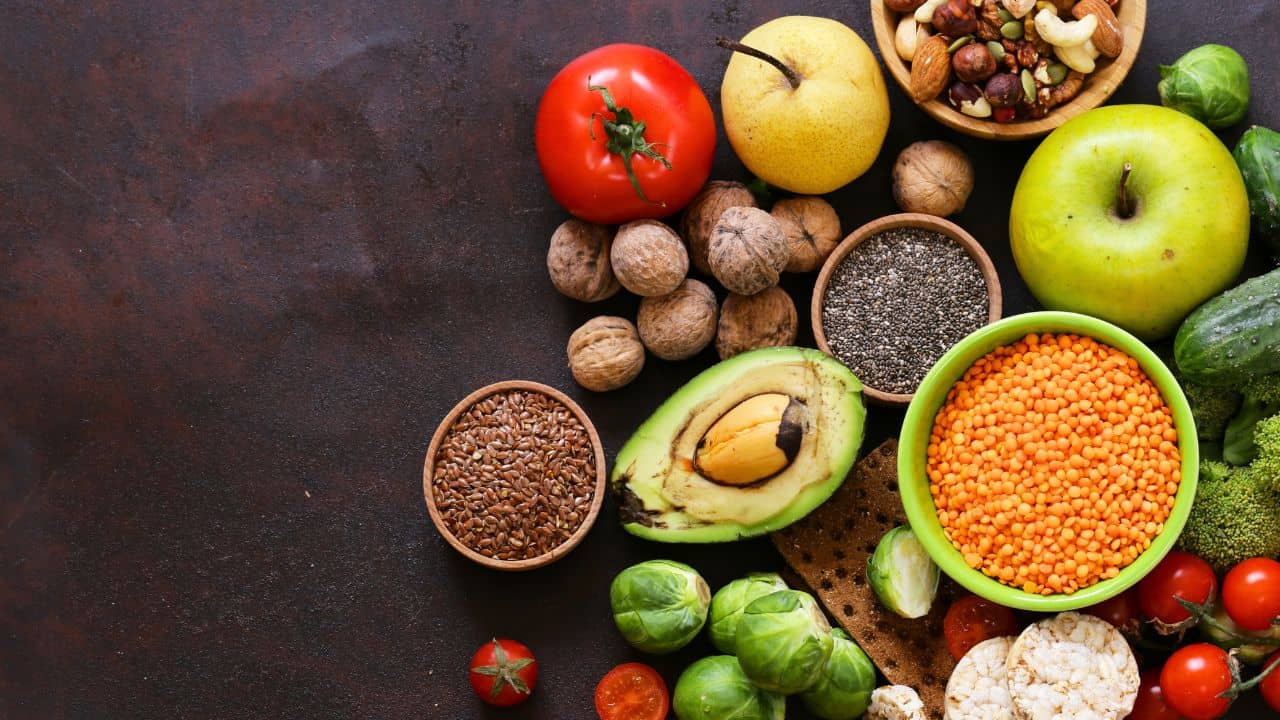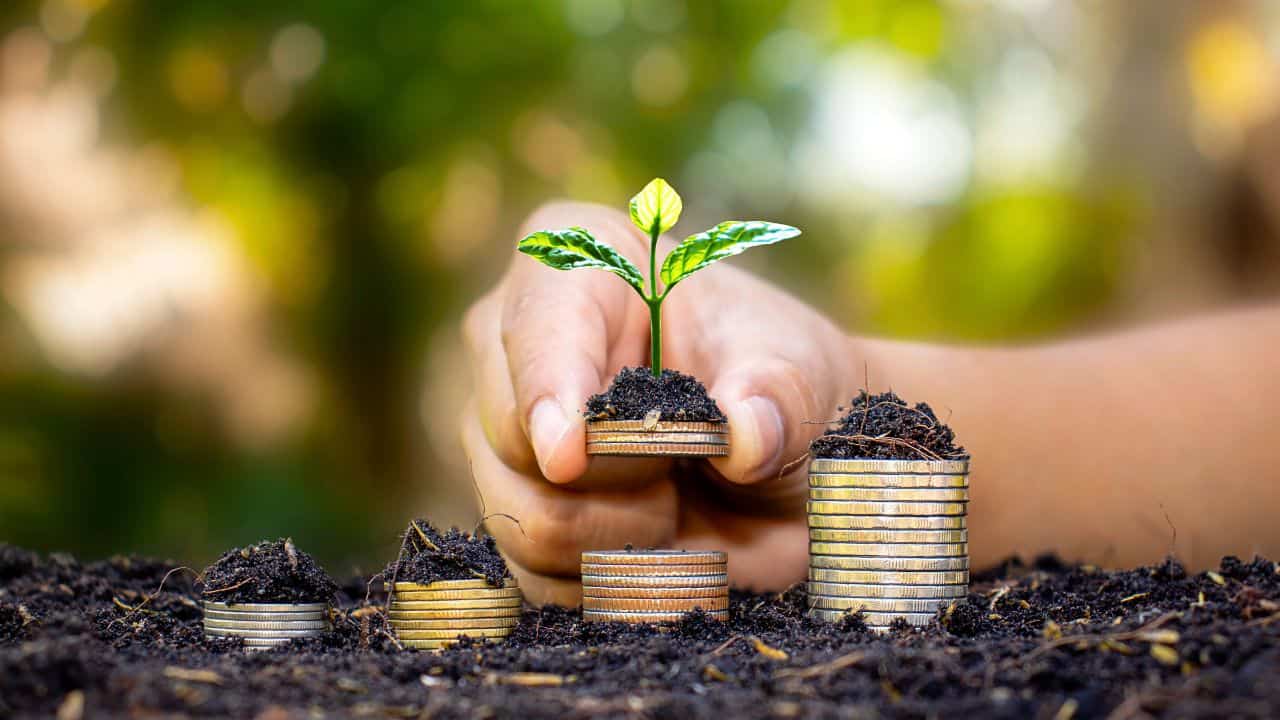Food systems have a crucial role in determining our planet’s health.
From farm to table, there’s a lot to consider when assessing the impact of a food product, and several challenges sustainable food brands need to face to serve up a planet-friendly plate.
The agricultural industry is a significant contributor to climate change, releasing vast amounts of methane, nitrogen dioxide, and CO2 into the atmosphere.
Resource-intensive mono crops grown with chemical inputs harm soil health, pollute waterways, negatively impact biodiversity, and compromise future food security. We’re also losing topsoil at an alarming rate, suggesting there are a finite number of harvests remaining unless the process is reversed through significant bioremediation efforts.
It doesn’t have to be this way. Sustainable food systems are possible, but they require change at a systemic level.
Transforming how we grow crops, raise animals, process, package, and distribute our food affects our health, the health of the planet, and the health of generations yet to come.
So what is a healthy and sustainable food system, and what is the most sustainable food retailer cooking up ways to make this happen?
Grab your knife and fork and let’s dig in.
Exploring Sustainable Food Companies
1. What Is Sustainable Food Production?
When considering what food products are sustainable, we need to look at a food item throughout its journey from field to fork, including where the ingredients are grown, how they are processed, and how they are packaged and distributed.
Beyond environmental effects, we also need to consider the social impact food products have on the people involved at all stages of the supply chain. Are farmers paid fairly? What about farm, factory, and distribution workers?
The health and nutrition aspects of food are essential, too. What impact do these foods have on the consumer? What nutritional value do they have and are they contributing to a healthy lifestyle?
Securing a sustainable food future requires addressing the environmental, social, economic, cultural, and health aspects of our food systems.
Let’s take a closer look at some of the factors sustainable food brands must consider when producing food that is a better deal for both people and the planet.
Soil & Water Health
Food brands that are sustainable partner with farmers and growers that care about their environmental impact and use organic, agro-ecological, or regenerative farming practices that promote the health of the soil, increase biodiversity and help sequester carbon.
Responsible ingredient sourcing is crucial and requires companies to fully trace their supply chain back to the farm level.
Reducing Emissions
More than one-third of worldwide greenhouse gas emissions are attributed to food systems.
Regenerative farms are the future, not least because they have a positive climate impact. It’s reassuring to see global food monoliths such as General Mills are also moving in this direction, helping to scale regenerative practices through partnership work and grant funding.
Beyond the farm level, we must consider the food miles that ingredients and products clock up on their journey to our plates. Buying locally grown and produced food is the ideal.
There are also emissions of manufacturing to take into account, and the most sustainable food companies have switched to 100% renewable energy or are working toward that end.
Fair Trade
Small-scale farms feed 70% of the global population. Let that sink in for a moment.
Future food security depends not on large-scale agribusiness, but on supporting small, sustainable farmers, many of whom are financially vulnerable due to fluctuating prices, unfair trading conditions, and a changing climate.
Sustainable food companies can help by ensuring ingredients have been fairly traded, for which the Fairtrade certification provides reassurance.
Reducing Waste
Globally, around one-third of food produced goes to waste. Despite that tragic amount of waste, 828 million people in the world are still considered “chronically malnourished”.
Reducing waste is, therefore, a crucial factor to address when designing and implementing sustainable practices that will lead to both sustainable food security and a drastic reduction in emissions—because once that food goes to the landfill, it decomposes anaerobically and releases methane gas, a GHG 25x as potent as CO2.
We also need to consider how we can reduce waste at all levels of the supply chain, from farming to retail, and how we can reduce food waste at the consumer level.
Health & Nutrition
The most healthy food brands produce natural, whole foods that are good for our bodies in a way that is healthy for the planet and all those involved in the supply chain.
This includes avoiding harmful chemicals at all stages and processing ingredients in a way that preserves their nutritional content. For that reason (and many more) organic food brands are the pillars of food system sustainability.
2. Examples Of Sustainable Food Products
Given the complex sustainability criteria, there’s no simple answer to dishing up the most sustainable food products. Factors include:
- the method of cultivation
- where the product is grown and manufactured
- energy and water consumption
- transport miles
- type of food packaging
- nutritional benefits
Taking into account those factors, what are 5 sustainable products when it comes to food?
Legumes & Pulses
Legumes, such as beans, lentils, and peas, are among the most sustainable foods companies can utilize in their products, especially given their versatility.
High in protein (with a lower carbon footprint than most animal sources), these nitrogen-fixing plants are commonly used in soil rotation to promote soil fertility, avoiding chemical-based fertilizers in the process.
Cereals & Grains
Provided they aren’t grown as an intensive mono-crop, cereals and grains can be sustainable foods and are a staple of many diets.
Cultivation of grains generally requires less water than animal-based products.
Ancient grains (such as amaranth, barley, buckwheat, bulgur, millet, rye, spelt, quinoa, and wild rice) are more readily grown as part of regenerative systems.
Stone-grinding grains is considered a nutritionally superior processing method, preserving more vitamin and mineral content.
Organic Fruit & Vegetables
The main criteria for selecting the most sustainable fruit and vegetables is that they are grown organically, making them a healthier choice for consumers and the planet.
You can also support growers that cultivate heirloom varieties. Maintaining a diverse seed bank of seeds is crucial to the future of food security.
Buying local food to reduce food miles and optimize nutrition through eating fresh produce is important. Local fruit and veg boxes and Community Supported Agriculture (CSA) schemes are sustainable alternatives to supermarket veg.
Seaweed & Algae
Seaweed and algae (by way of spirulina and chlorella powders) are sustainable superfoods that have been making a comeback in recent years.
Full of valuable nutrients, both water-born plants can be grown and harvested sustainably, with seaweed farms offering several environmental benefits. They can sequester carbon, balance water nutrient levels, and provide important habitat.
Algae specifically has benefits because it can be wild-harvested from natural waterways where it would otherwise have negative impacts on the natural ecosystem. Because of the huge amounts of agricultural fertilizer runoff, many natural waterways become too enriched with nutrients, a process known as eutrophication. This leads to prolific algae growth that chokes out other plant and animal life.
Stopping synthetic runoff is the ultimate goal, but in the meantime, harvesting and putting that algae to good use is a significant step toward minimizing this sector of agriculture’s environmental impact.
Products Made From Food Waste
Some of the best sustainable food and beverage companies, like Barnana, Rubies in the Rubble (see below), and Toast Ale, source surplus or byproduct ingredients that would otherwise go to waste and use them to create their products.
Innovative upcycling is a great way to tackle food waste.
3. The Role Of Sustainable Food Production Technologies
From greenhouse robotics and AI soil sensors to hydroponics and vertical farming, sustainable smart technology in food production and processing is an emerging sphere.
Closed-loop hydroponic systems that capture and reuse water, for example, can help balance water scarcity with an increasing demand for water in food production. They may have a role to play in bringing food production closer to urban centers and food deserts where scarcity is highest.
Precision agriculture uses sensors, drones, and other tools to monitor crop growth and soil conditions, allowing farmers to optimize water and fertilizer use and reduce waste. This helps to minimize the environmental impact of farming practices while maximizing yields.
And let’s not forget recent technological advancements allowing for more plant-based meat and dairy alternatives, combatting the huge impact of animal agriculture, of which stopping would effectively halt the increase of atmospheric greenhouse gasses for 30 years.
In addition to meat substitutes, some sustainable food companies (like UPSIDE Foods) are experimenting with cultured or cultivated meat. This refers to growing meat in a lab using animal cells, without the need for raising and slaughtering animals.
There is also plenty of room for innovation at the food processing stage, from preserving and food packaging to food storage and dealing with waste.
Like all new technologies (say, 3D printing and sustainable smart cities), green food technologies should be evaluated for their environmental, social, economic, and health impacts to ensure they deliver healthier, fairer, and planet-positive solutions.
4. Examples Of Sharing Economy Sustainability
The technologies are emerging rapidly, but what brands are taking advantage of them and being more sustainable when it comes to serving up a planet-friendly supper?
We rounded up the most sustainable food brands from the UK, USA, and Canada.
From organic pioneers and sustainable farming old hands, to new brands upcycling waste ingredients, it’s heartening to see a number of sustainable food companies considering a triple bottom line and working towards a positive food future.
The Top Sustainable Food Brands (USA & Canada)
Clif Bar
Taking a holistic approach to sustainable food production, Clif Bar offers protein-packed, plant-based energy snacks and drinks created with the well-being of people and the planet in mind.
82% of their ingredients hold an organic or other sustainability certification (i.e. Rainforest Alliance Certified™ cocoa and palm oil).
All of their facilities run on green electricity, 90% of their waste is diverted from landfill, and they’re aiming for 100% of their packaging to be reusable, recyclable, or compostable by 2025.
You can read more about Clif Bar’s sustainability endeavors in their latest annual report.
Lundberg Family Farms
Pioneering sustainable food brand Lundberg has been serving sustainably grown rice for decades.
Certifications include Regenerative Organic Certified®, USDA Organic, and Non-GMO Project Verified, and all rice and quinoa products are produced in a TRUE Zero Waste Certified facility.
Lundeberg partners with the Climate Collaborative (CC), the Sustainable Food Trade Association (SFTA), and One Step Closer to an Organic and Sustainable Community (OSC2).
Most of their plastic packaging (except for their Heat and Eat bowls) is recyclable via the brand’s partnership with Terracycle, and they use recyclable paper for some products.
A member of the Bulk Grain Council, you can find Lundberg’s products at major grocery chains such as Whole Foods and Costco, but they’re working to get their products into local independent wholefood and zero waste stores.
Nature’s Path
A pioneer among eco-friendly food brands, Nature’s Path was the first to offer USDA organic certified cereal, and they remain one of the few sources of mostly seed oil free grain products.
The Canadian health food brand now offers a range of organic cereal, chips, granola, and oatmeal produced in Zero Waste-certified facilities.
A member of the STFA, they’re on a journey to become climate neutral and have 100% sustainable packaging (reusable, recyclable, or compostable) by 2025.
Nature’s Path aims to donate 2 million dollars every year to charity partners and food banks.
UPSIDE Foods
The aforementioned UPSIDE Foods (formerly known as Memphis Meats) is less a sustainable food and drink brand, and more a food technology company that produces meat directly from animal cells.
The company’s goal is to create a more sustainable and ethical food system by reducing greenhouse gas emissions, land use, and water use associated with traditional meat production, and improving animal welfare by ceasing animal slaughter.
Their production process uses significantly less energy and land than traditional meat production, and they are working to make their process more efficient and sustainable over time.
Additionally, UPSIDE Foods has committed to using only plant-based ingredients in their growth medium and to ensure their meat is produced without antibiotics or hormones.
The Best Sustainable Food Brands (UK & Europe)
Alara Wholefoods
One of the best sustainable vegan food brands in the UK, London-based Alara Wholefoods ticks all of the sustainability boxes to produce its range of organic, net zero-carbon, and fair trade cereal products.
All their products (muesli, granola, and milled seeds) are 100% natural, non-GMO, and contain no refined sugar (they use coconut blossom nectar in the granola).
Audited by the Soil Association, British Retail Consortium (BRC), ISO 14001, and SMETA, the sustainable food brand has robust third-party assurances for food safety, environmental and social performance.
In 2008, Alara’s King Cross factory became the first zero waste food manufacturer. Nothing gets sent to landfill, and thanks to compostable product housing, they’re one of the top food brands with sustainable packaging.
Alara also uses 100% renewable energy and their carbon offsets support sustainable farming practices via a partnership with Rainforest Saver.
Biona
One of the first organic and sustainable food companies UK residents had access to, family-run Biona has been offering organic food products for over 30 years.
They work with ethical suppliers to offer a large range of 100% organic and GMO-free products, including bread, beans, pulses, cereals, condiments, drinks, pasta, rice, seeds, and more.
Their range includes vegan and gluten-free items, and their palm oil is RSPO-certified, though they’re working towards becoming palm oil free.
The sustainable food company powers its London HQ with 100% renewable energy and many of its products are produced using green energy, too.
To minimize plastic packaging Biona uses glass, BPA, BPS, and BPF-free aluminum, and several products now come in paper packaging (pasta, rice, and grains).
They work with several community partners, including FairShare and City Harvest Londo to donate boxes of food to those in need.
Doves Farm
Committed to organic farming and responsible sourcing practices, Doves Farm offers biscuits, cereals, and a large selection of flours, including those made from ancient and specialty grains.
In addition to their own 350-acre organic farm in Wiltshire, Doves Farm works with organic farms in the UK and abroad. They have a fully traceable supply chain and prioritize partners that are SEDEX registered.
The palm oil used in some of this sustainable brand’s food is RSPO-certified and all packaging is recyclable.
Doves Farm caters to a gluten-free diet with its Freee Foods range of products.
Hodemedods
Hodmedods sell British-grown grains, flour, and pulses sourced from sustainable farms. The award-winning sustainable food brand focuses on lesser-known, planet-friendly specialist crops and offers an organic range certified by the Soil Association.
They launched following The Great British Beans Project which tested the market for fava beans, a sustainable nitrogen-fixing crop that provides food for bees and other pollinators.
Their specialist range also includes “Black Badger” Carlin peas and quinoa grown in Essex.
Homedods is a Living Wage employer and all staff are paid above Living Wage Foundation recommendations.
Rubies In The Rubble
Tackling food waste head-on, UK sustainable food brand Rubies In The Rubble create their award-winning condiments from surplus ingredients that would otherwise go to waste.
To date, the Certified B Corp has saved over 351,600 kg of fruits and vegetables that were the wrong size or shape, overripe (bananas), fallen from the vine (tomatoes), or simply surplus to demand.
The Cornish Seaweed Company
Embracing the sustainability of sea vegetables, The Cornish Seaweed Company offers a certified organic range of dried seaweed, flakes, seasonings, and supplements.
Their seaweed is sustainably harvested by hand from wild and farmed sources on the West Cornwall coast before being carefully dried to preserve nutrients.
The eco-friendly food brand set up its sustainable seaweed farm in 2017 and is carrying out research in partnership with the University of Exeter and the Marine Biological Association. So far, results show several positive environmental benefits for local marine ecology.
Wholly Greens
Netherlands-based Wholly Greens is serving up pro-planet pasta made with 50% vegetables, 17% of which are upcycled from food waste.
The Certified B Corp sustainable food brand is serious about nutrition and supporting families to make healthy eating easier, carefully choosing to work with only sustainable farms.
Closing Thoughts On Sustainable Brands, Food, & Systems
What is the main goal of sustainable food production?
In a (sustainably grown) nutshell, it’s about growing and producing food in a way that respects the planet, people, and animals and ensures food security for future generations.
From sourcing organic ingredients and resurrecting nutritious heritage crops to upcycling waste ingredients, sustainable food brands are embracing practical, resourceful, and creative ways to address food sustainability.
It’s an exciting space to follow, and one that needs to accelerate quickly to ensure future food security.










